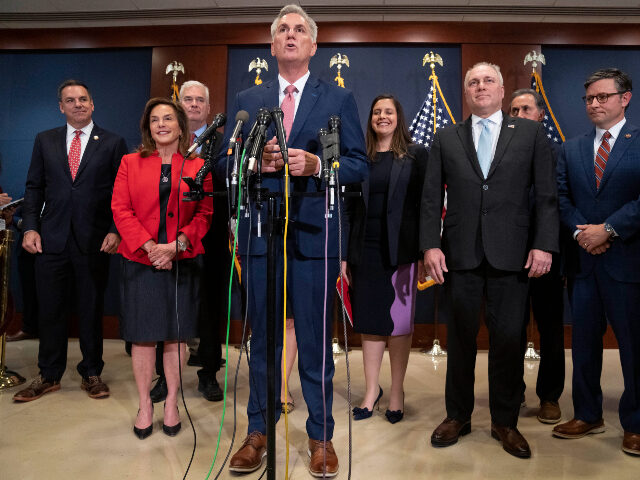House Minority Whip Steve Scalise (R-LA) has whipped House members against voting for a short term government funding bill that Democrats and some establishment Republicans want to pass before a potential shutdown on Friday.
The shorter funding bill was revealed earlier Tuesday and is expected to receive a vote on the House floor later on Wednesday. The bill is designed to give establishment Republicans and Democrats more time to negotiate a larger “omnibus” government funding bill for this fiscal year.
“Once again, House Democrats failed to meet the fundamental duty of funding the government despite spending most of the year passing trillions in wasteful spending that has fueled inflation and driven up our debt,” Scalise said.
“This one-week continuing resolution is an attempt to buy additional time for a massive lame-duck spending bill in which House Republicans have had no seat at the negotiating table,” he added.
GOP House leadership has whipped against the short term spending bill because it believes incoming Republican House members should have a say in federal expenditures in the omnibus package that would fund the government until the end of the current fiscal year on September 30, 2023.
Sen. Mitch McConnell (R-KY) and retiring Senate Appropriations Chair Patrick Leahy (D-VT) oppose House Republican leadership’s strategy to whip against the short term spending bill. On Tuesday evening, they reached a tentative framework with Democrats on the omnibus package that would set the budget for this fiscal year. If the shorter spending bill is defeated, it would put more pressure on the establishment to allow House Republicans a greater seat at the negotiating table.
“I think we’re very close to getting an omnibus appropriations bill,” McConnell said Tuesday.
McConnell and Leahy’s omnibus package is rife with 7,500 earmarks totaling $16 billion. Bloomberg Government reported on the earmarks:
The Senate included 3,123 earmarks totaling $7,780,973,000 in its fiscal 2023 appropriations bills released in July, according to a Bloomberg Government analysis of nine documents published by the Senate Appropriations Committee. A central Excel document containing all the earmarks, compiled from the nine PDF files, is available here. On the House side, lawmakers included 4,386 earmarks totaling $8,231,999,565 according to an analysis earlier this year. A central Excel doc with the House earmarks is available here. Combined, the two chambers have published 7,509 earmarks totaling $16,012,972,565.
The earmarked funding total is slightly less than 1% of the roughly $1.7 trillion government funding package lawmakers hope to finish this year. Members agreed to apply a 1% limit to the new earmarking process when they brought it back ahead of fiscal 2022, after a decade-long ban on the process.
Follow Wendell Husebø on Twitter @WendellHusebø. He is the author of Politics of Slave Morality.

COMMENTS
Please let us know if you're having issues with commenting.